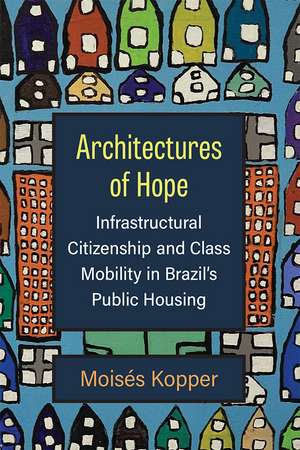Architectures of Hope: Infrastructural Citizenship and Class Mobility in Brazil's Public Housing
Autor Moisés Kopperen Limba Engleză Paperback – 17 noi 2022
Drawing on a five-year-long ethnography among city planners, architects, street-level bureaucrats, politicians, market and bank representatives, community leaders, and past, present, and future beneficiaries, Moisés Kopper tells the story of how a group of grassroots housing activists rose from oblivion to build a model community. He explores the strategies set forth by housing activists as they waited and hoped for—and eventually secured—homeownership through Minha Casa Minha Vida’s public-private infrastructure. By showing how these efforts coalesced in Porto Alegre—Brazil’s once progressive hotspot—he interrogates the value systems and novel arrangements of power and market that underlie the country’s post-neoliberal project of modern and inclusive development.
By chronicling the making and remaking of material hope in the aftermath of Minha Casa Minha Vida, Architectures of Hope reopens the future as a powerful venue for ethnographic inquiry and urban development.
| Toate formatele și edițiile | Preț | Express |
|---|---|---|
| Paperback (1) | 267.10 lei 22-36 zile | +27.03 lei 5-11 zile |
| UNIVERSITY OF MICHIGAN PRESS – 17 noi 2022 | 267.10 lei 22-36 zile | +27.03 lei 5-11 zile |
| Hardback (1) | 518.12 lei 22-36 zile | +30.98 lei 5-11 zile |
| UNIVERSITY OF MICHIGAN PRESS – 17 noi 2022 | 518.12 lei 22-36 zile | +30.98 lei 5-11 zile |
Preț: 267.10 lei
Nou
Puncte Express: 401
Preț estimativ în valută:
51.11€ • 53.51$ • 42.29£
51.11€ • 53.51$ • 42.29£
Carte disponibilă
Livrare economică 17-31 martie
Livrare express 28 februarie-06 martie pentru 37.02 lei
Preluare comenzi: 021 569.72.76
Specificații
ISBN-13: 9780472055647
ISBN-10: 047205564X
Pagini: 362
Ilustrații: 2 tables, 3 graphs, 46 figures
Dimensiuni: 152 x 229 x 25 mm
Greutate: 0.57 kg
Editura: UNIVERSITY OF MICHIGAN PRESS
Colecția University of Michigan Press
ISBN-10: 047205564X
Pagini: 362
Ilustrații: 2 tables, 3 graphs, 46 figures
Dimensiuni: 152 x 229 x 25 mm
Greutate: 0.57 kg
Editura: UNIVERSITY OF MICHIGAN PRESS
Colecția University of Michigan Press
Notă biografică
Moisés Kopper is a Postdoctoral Researcher at the Laboratoire d’Anthropologie des Mondes Contemporains.
Cuprins
List of Illustrations
Preface and Acknowledgements
Part I—Introduction
The Subjunctivity of Hope
Hoping for the Future
Part II—Infrastructural Citizenship
1. The Making of a Model Community
2. The Machine of Worthiness
3. Waiting and Hoping
4. Cartographies of Wellbeing
Part III—Middle-Class Sensorial
5. Topographies of Consumption
6. Democracies of Hope
7. Infrastructuring Class
Conclusion. Post-Neoliberal Hopescapes
Bibliography
Preface and Acknowledgements
Part I—Introduction
The Subjunctivity of Hope
Hoping for the Future
Part II—Infrastructural Citizenship
1. The Making of a Model Community
2. The Machine of Worthiness
3. Waiting and Hoping
4. Cartographies of Wellbeing
Part III—Middle-Class Sensorial
5. Topographies of Consumption
6. Democracies of Hope
7. Infrastructuring Class
Conclusion. Post-Neoliberal Hopescapes
Bibliography
Descriere
On the eve of the 2008 financial crisis, Brazil implemented its largest-ever public housing program, the Minha Casa Minha Vida
Recenzii
“Architectures of Hope is a powerful statement on how inclusive social policies can transform a community by creating hope and agency that are backed up by public investments. Moisés Kopper presents a deeply insightful ethnography which documents the changes in an urban community mobilized by ‘material hope’ and the development of a new sense of belonging.”
—Jens Beckert, Director, Max Planck Institute of Societies
—Jens Beckert, Director, Max Planck Institute of Societies
“With nuanced ethnographic description and incisive analysis, Kopper takes us inside a public housing project in Porto Alegre, Brazil, showing the complicated ways the personal and the structural are intertwined. The result is an exciting new perspective on the social and affective pull of hope, the political-economy of precarity, and the ways these intersect with state-sponsored infrastructure development.”
—Edward F. Fischer, author of The Good Life: Aspiration, Dignity, and the Anthropology of Wellbeing
—Edward F. Fischer, author of The Good Life: Aspiration, Dignity, and the Anthropology of Wellbeing
“Architectures of Hope brings to life the demographic transformations that took place during the PT years, using evocative ethnography and anthropological analysis to uncover the meanings and subjectivities associated with participation in the signature housing initiative, Minha Casa, Minha Vida. Kopper’s account sheds important new light on what poverty-reduction initiatives look like from the ground up, simultaneously hopeful and contradictory.”
—Benjamin Junge, State University of New York at New Paltz
—Benjamin Junge, State University of New York at New Paltz
“Kopper gives us a remarkable ethnography that connects the personal lives of the urban poor with the political processes that transformed contemporary Brazil. Architectures of Hope shows the skill of an ethnographer able to innovate conceptually to illuminate in a vivid way how politics and the market transformed the daily lives of the most marginalized in one of the most unequal countries in the world.”
—Ariel Wilkis, Escuela IDAES-Universidad de San Martín, and author of The Moral Power of Money
—Ariel Wilkis, Escuela IDAES-Universidad de San Martín, and author of The Moral Power of Money
"Beyond offering an engaging text to scholars of Latin American post-neoliberalism and anthropologists of infrastructure and class, I believe the book’s biggest contribution is the innovative conceptual toolbox it puts forth. . . . Far from engaging in a simplified critique of the housing movements studied or an endorsement of the discourse of activists, the book crafts a complex narrative which makes visible fragments of hope pivotal to any quest for the good life."
